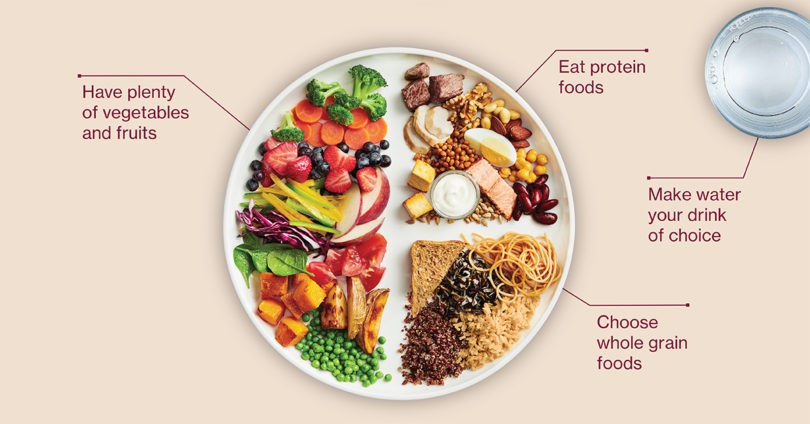Eat healthy
EN | FR
What is eating healthy?
Eating healthy is more than just the food on your plate, it includes other factors such as cooking, eating meals with others, and enjoying your food while being mindful of your eating habits. It also means following a balanced diet with a variety of foods that give you the nutrients you need to maintain your physical, mental, and social well-being. These nutrients can come from proteins, whole grains, fruits, and vegetables.
What are the benefits of eating healthy?
Eating healthy contributes to healthy development from early childhood to later stages in life. Eating a balanced diet and building healthy eating habits will decrease your risk of many chronic diseases, such as:
- type 2 diabetes
- obesity
- heart disease
- a variety of cancers
Which cancers can be prevented?
Cancer risk is impacted by what we eat. Not eating enough fruits, vegetables or fibre can increase your cancer risk. In addition, unhealthy food habits such as eating too much, eating too fast, skipping meals, and eating highly processed foods can increase the chance of developing colon, pancreatic, endometrial, lung, breast, stomach, ovarian, liver, bladder, and esophageal cancers.
There is strong evidence that eating wholegrain foods and foods high in fibre protects against colon cancer. Where, a diet with lots of red meat and processed meat (more than three portions per week) can increase the risk of colon and rectal cancers. Diets with more processed and fast foods, which are often high in fat and sugars, can lead to weight increases. This can cause obesity-related cancers, such as endometrial, breast, liver, ovarian, colon, and esophageal.
According to the ComPARe study, six out of 10 Canadian adults do not follow a healthy diet. As an example, we can prevent around 1300 cancer cases in 2038 if all Manitobans eat healthy, starting today. A healthy diet includes:
- eating at least four servings of fruit every day
- eating at least four servings of vegetables every day
- avoiding red meat
- avoiding processed meat
How does eating healthy prevent cancer?
Fast foods and other processed foods often have a lot of sugar and fat. These high-calorie foods can cause weight gain. Eating healthy nutrients and being careful about portion sizes will help you maintain a healthy weight. This can reduce your risk of obesity-related cancers.
What can I do to eat healthy?
To help protect against cancer and other chronic diseases, this is how your plate should look:

Source: Health Canada
It can be hard to know what a healthy serving size is and how much you should eat at a meal and in a day. See some tips and examples below:
| When | What to do |
|---|---|
At a meal |
Fill half your plate |
In the day |
Eat 7-10 servings |
Examples of food servings |
|
At a meal |
Fill no more than 1/4 of your plate |
In the day |
Eat 6-8 servings |
Examples of food servings |
|
At a meal |
Include a palm-sized portion |
In the day |
Eat 2-3 servings |
Examples of food servings |
|
Source: Health Canada
Source: Handy Guide to Serving Sizes
Portion Sizes

one cupped hand

fist

half fist

palm
What foods should you limit to make sure you're eating healthy?
To eat healthy and reduce your risk of cancer:
- limit fast foods
- limit highly processed foods
- limit sugar-sweetened drinks
- limit red meat (beef, pork, lamb, and goat) to less than one serving (2.5 oz or palm-sized) per week
- limit foods made from white flour (bread, pasta, pizza), other bakery foods
- limit candy
No single food will quickly change your health. Eating a balanced diet in moderation is key. Eating healthy is a lifelong habit that takes time and motivation to develop.
Other tips:
- Make time to enjoy healthy meals with family or friends
- Avoid distractions like TV or electronics while eating
- Use food labels to learn nutrition facts and ingredients of a food product
Here are some programs and resources to help you eat healthy.
Programs and Services
Winnipeg Regional Health Authority: Eating for Health
NorWest Co-op (Winnipeg): Hans Kai
Healthy Start (Winnipeg)
Healthy Baby Program (Manitoba)
Interlake-Eastern RHA: Food & Nutrition
Southern Health- Santé Sud: Healthy Eating Workshop
Prairie Mountain Health: Public Classes and Clinics
Get Better Together in Winnipeg, Prairie Mountain, Interlake-Eastern, Southern, and online
NorWest Co-op (Winnipeg): Community Lunches
Interlake-Eastern RHA: Local Food Banks
Canada's Food Guide: First Nations, Inuit and Métis
Dietitians of Canada UnlockFood.ca: Nutrition and Cancer and Size up your food portions
Canadian Cancer Society: Eat Well
World Health Organization: Carcinogenicity of the consumption of red meat and processed meat
World Cancer Research Fund: Cancer Prevention Recommendations

